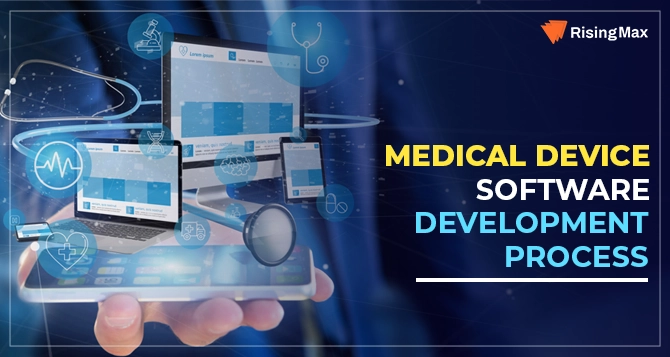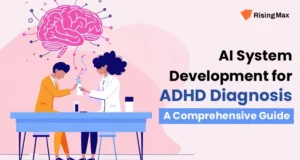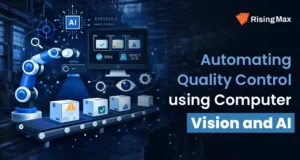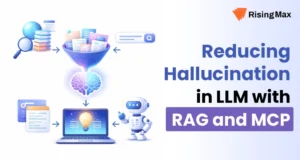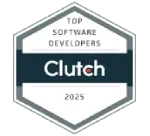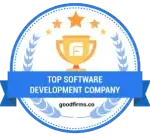Due to the influence of digitization, the medical industry is going through a significant transformation. If you work in the healthcare industry, you know the superior experience patients and customers receive from custom medical device software.

Since the start of the COVID-19 pandemic, the market for medical software has expanded at a 2X rate. By 2023, the global healthcare sector’s service market is anticipated to amount to 79.56 billion dollars. You must have been intrigued by the numbers.
Additionally, it is critical to come up with top-notch medical device software development solutions to improve the standard of medical care and medical business management and to reach out to patients in a more accessible way. The medical staff will primarily benefit from the uninterrupted workflow services that will be provided to the healthcare sector.
RisingMax Inc. is the foremost custom healthcare software development company, providing medical device software with top-notch features and dependable, intuitive workflow to manage various tasks in the healthcare sector.
Key Takeaways
- By 2025, it’s expected that this useful technology will have sold more than a quarter of a billion copies.
- Medical device software is on-premises or cloud-based applications created for different healthcare facilities to store, process, and manage administrative, financial, and medical data.
- By raising patient awareness of their health status, medical device software can assist patients in managing their health more successfully, improving diagnostic accuracy and decreasing human error.
- Hospitals may be able to free up staff time for other, more important tasks while saving time and effort by utilizing smart devices and apps to automate medical operations. Additionally, because medical device software can reduce the number of hospitalizations, healthcare facilities need less space.
Want to know more about medical device software development and what goes into it? This blog will guide you through it all; eager to learn? Let’s get going!
Application Areas For Medical Device Software Development
Remote Care
High-quality remote patient monitoring and consulting are made possible by our solutions. These applications, linked to sensors, continuously track health indicators and transmit the information so that it can be instantly synchronized with pertinent clinical systems for the clinician to review.
Patient Self-service
Users of medical devices can keep an eye on their lifestyle, sleep, diet, and mental health with the help of software. By managing their medical devices via smartphones and updating their health records on the go, they have more control over their own health.
Diagnostic And Treatment Assistance
We use cutting-edge technologies to make medical procedures quicker, more accurate, simpler for medical professionals to perform, and more comfortable for patients. Additionally, our solutions simplify diagnostic adjustments, improving the precision of specific tests and overall diagnosis.
Mass Measurement And Analysis
High-precision measurements of both small and large amounts of any substance are carried out by medical device software. Additionally, it makes effective compound analysis and medication quality control possible.
Facilities Monitoring And Management
Our solutions can simplify inventory management, resource tracking, and optimization at healthcare facilities. Medical device software also assists in maintaining a building’s water and air quality, notifying relevant parties in the event of an outbreak of an infection inside a hospital.
Medication Management
We create software that supports proper medication storage, discharge, and disposal (such as storage conditions monitoring solutions) and helps ensure patients’ timely, safe, and accurate medication administration (e.g., automated reminders, medication pumps, adverse reaction trackers, drug interaction trackers)
Align the current state of IT with your business strategy by hiring the most trustworthy Medical Device Software Development Company
Optimize Your Healthcare Business With Our Solutions
Our medical device software development team creates specialized solutions that enhance workflow, security, and connectivity. We strive to provide solutions tailored to your unique business needs and objectives because we recognize that there is no such thing as a one-size-fits-all service. RisingMax Inc. works with you to determine how to increase your medical products’ productivity, efficiency, usability, and reliability.
Medical Device Application
In response to client requirements, our medical device software development team creates solutions that interface with medical devices.
POC & LAB Instrument
Using Point of Care (POC) technology and solutions, you can streamline workflows and significantly lessen the workload for your staff.
Cloud & IoT Solutions
Utilizing cloud technology and IoT solutions makes it possible to safely store and access medical data and increase connectivity between all medical devices.
UI/UX
Our design team develops user-friendly software for patients, medical professionals, and technicians. To increase productivity, the most user-friendly applications must be created.
SW Architecture
We develop solutions that optimize medical device systems based on philosophies based on medical device software development principles.
Mobile Health Solutions
To increase productivity and control, utilize specialized mobile apps to access medical device information from any location.
Custom Medical Device Software Development Perks
Better Patient Outcomes
Medical device software can improve diagnostic accuracy, decrease human error, and help patients become more aware of their health status and manage it more successfully.
Less Care Cost
By reducing the time and effort required for these tasks through the use of smart devices and apps, medical facilities can free up staff for more urgent tasks. Healthcare organizations also require less space as medical device software lower the number of hospitalizations.
Improved Patient Engagement
When patients have more control over their health or receive high-quality care, they are happier overall. With the help of medical device software, healthcare providers can accomplish both goals, improving patient satisfaction with their medical institution and increasing their likelihood to participate in surveys and research, pay for new services, and stick with their provider.
New Business Opportunities
Savvy medical device software development enables businesses to make the most of their resources to focus on creating new business opportunities. Medical businesses with cutting-edge technology can draw in new patient populations and provide novel services.
Data Security
The safe collection, storage, transfer, and removal of sensitive data are guaranteed by medical device software that complies with the most recent regional regulations. This software is also more resistant to human error and ransomware attacks, which prevents data breaches and unintentional leaks.
Tech Stack For Medical Device Software Development 2023
New technologies are periodically introduced in every niche, including the medical sector, as the era of digitization takes hold. As a result, it’s critical to adapt to new developments and stay current with processes. So let’s start using the best technologies to create medical device software.
Blockchain
The blockchain is the one that will fundamentally alter the medical industry. Numerous blockchain-based start-ups tackling some of the real issues in the medical sector demonstrate how much potential it has there. Users can maintain complete privacy and anonymity with the decentralized functionality.
AR/VR
Other technologies like virtual and augmented reality are anticipated to change the medical sector in the years to come significantly. With augmented reality, patients can communicate with their doctors from a distance, and the doctor can respond by using voice or facial expressions.
Artificial Intelligence
Almost all businesses worldwide have seen an increase in the use of artificial intelligence, and different industries have noticed this trend as well. But AI will significantly alter the healthcare industry in many ways. Medical AI software can make decisions independently and automate certain tasks.
Machine Learning
It is yet another technology widely used in various sectors, particularly medicine. The application of machine learning, which has been around for a while, will only grow as more potent software becomes available.
Chatbots
Many industries already use chatbots, especially the medical sector, where their use will increase. Effective communication between medical professionals and patients will be made possible by them, and they will also be able to interact with users using their sizable libraries.
How Is Medical Device Software Development Process Implemented?
Medical device software goes through the same development phases as other software, with the addition of regulatory approval and a more difficult validation stage. Medical device software development follows a clear, organized medical device software development process that complies with established standards and guidelines. The six equally crucial phases of software development for medical devices are as follows:
Requirements Gathering
All functional and security requirements are gathered by the developers and added to a backlog. At this early stage, medical device cybersecurity is a crucial factor.
Designing
The software development plan and a minimum viable product pilot run are introduced to enhance user experience. Additionally, it entails collaborating with stakeholders to get background information on industry best practices.
Development & Testing
The prototype created in the earlier stage serves as the foundation for the work of medical device software developers. Coding, testing, UI/UX design, and quality assurance are all part of development. Development can be finished internally or with a qualified partner.
Validation & Pivoting
Validation guarantees the usability, quality, and safety of the software design for medical devices. Coordination, design, and execution of trials and research studies for product validation are required at this stage.
Regulatory Approval
The process of obtaining approval requires applying to regulatory bodies, submitting the Software to them, and then waiting for a response. With this step in mind, all prior work by medical device software developers has been finished.
Deployment
At this point, the software solution in healthcare is implemented. Additionally, this is when plans are made for large-scale commercialization of the software and when it is listed in formularies. Once the entire software development process for medical devices is complete, it is time for maintenance and ongoing updates based on user feedback.

Are you Prepared For Medical Device Software Development Trends In The Future?
The market for the development of medical devices offers a lot to look forward to.
There will be obstacles to overcome, but there is a great chance. The secret to success lies in these medical device trends. You can create smart early design and development trends by collaborating with IT companies that house medical device developers. Additionally, it will increase the ability to move more quickly in the market.
Contact RisingMax Inc.’s medical device software development engineer if you’re unsure what a partnership might entail. With years of experience, this custom software development company shows you the best path to bringing innovation to healthcare products.

